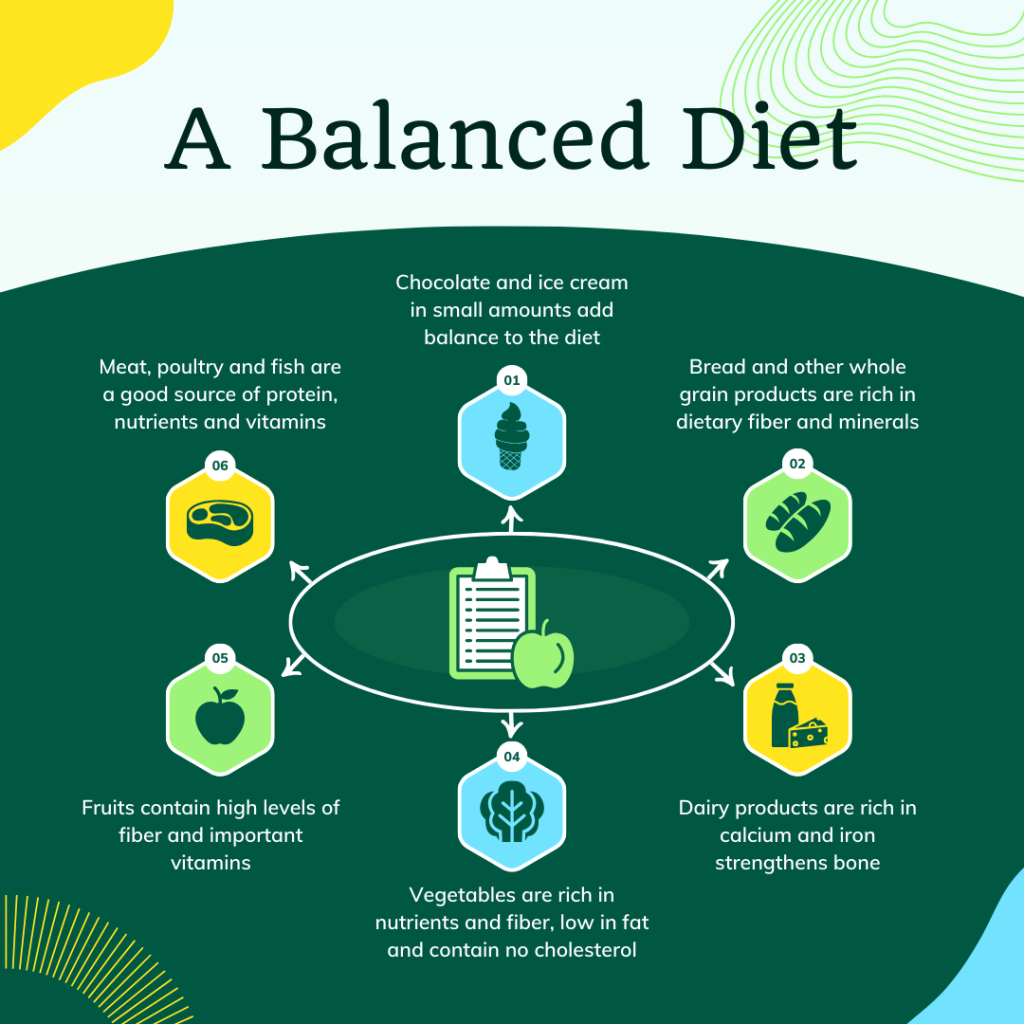
Understanding Macronutrients: Protein, Carbs, and Fats
In the pursuit of a healthier lifestyle and effective weight management, a thorough understanding of macronutrients—protein, carbohydrates, and fats—is paramount. These macronutrients serve as the cornerstones of our diet, influencing our overall well-being in profound ways. In this comprehensive blog post, we’ll embark on an in-depth exploration of macronutrients, their distinct roles, and how to optimize their consumption for a balanced and mindful approach to eating.
Macronutrients Unveiled: Their Vital Roles
Protein, carbohydrates, and fats are the three macronutrients that furnish our bodies with the energy and essential components required for various physiological functions. Let’s delve deeper into the functions of each macronutrient:
Proteins: The Foundation of Life’s Machinery
Proteins serve as the body’s fundamental building blocks, orchestrating a myriad of vital roles through complex biochemical processes:
Muscle Maintenance and Growth:
Within muscle tissues, proteins play an indispensable role in repairing and augmenting muscle fibers. When muscles undergo the stress of exercise or physical activity, micro-tears occur. Proteins are responsible for mending these tears, ultimately leading to muscle growth and enhanced strength. Athletes, in particular, rely on adequate protein intake to support these reparative processes, facilitating the development of lean body mass.
Cellular Repair:
Proteins are the chief architects of cellular repair. Our bodies constantly undergo cellular turnover, with old or damaged cells being replaced by new ones. This intricate process relies heavily on proteins to synthesize the necessary components for cell regeneration. Additionally, proteins are involved in DNA repair, ensuring the integrity of genetic material within our cells. Moreover, enzymes and hormones, essential for numerous physiological functions, are produced with the assistance of proteins. These enzymes catalyze chemical reactions within the body, enabling various biological processes vital to our health and well-being.
Immune System Support:
Proteins are the backbone of our immune system. Antibodies, which are proteins, act as specialized defense mechanisms against invading pathogens such as bacteria, viruses, and other foreign substances. When the body detects an infection or threat, it mobilizes antibodies to neutralize and eliminate the intruders. Additionally, immune cells, like white blood cells, rely heavily on proteins to carry out their functions effectively. These proteins are the vanguard of our immune response, ensuring our bodies can fend off illnesses and maintain robust immune defenses.
In essence, proteins are not just dietary components; they are the architects of our physical well-being, orchestrating intricate biological processes that are essential for muscle health, cellular repair, and immune system strength. Understanding the profound role of proteins in these biological processes underscores their significance for our overall health and the importance of consuming an adequate amount of protein-rich foods to support these vital functions.
Carbohydrates: The Dynamic Energy Source
Carbohydrates serve as the body’s primary source of energy, but their significance goes well beyond mere fuel:
Energy Production:
Carbohydrates are converted into glucose during digestion, which serves as the body’s immediate and preferred energy source. Once glucose enters the bloodstream, it can be readily transported to cells throughout the body, providing the energy needed for various physical activities, from brisk walking to strenuous exercise. This conversion of carbohydrates into glucose fuels the metabolic processes required to sustain life and perform daily tasks.
Brain Function:
Glucose derived from carbohydrates is especially crucial for optimal brain function. The brain relies predominantly on glucose as its primary energy source. When glucose levels are steady and sufficient, cognitive processes such as memory, focus, and problem-solving are optimized. In situations where glucose availability is compromised, cognitive performance may decline, emphasizing the vital role of carbohydrates in maintaining cognitive acuity.
Digestive Health and Weight Management:
Carbohydrates encompass a broad spectrum, including dietary fiber—a component with profound effects on digestive health. Dietary fiber, found abundantly in fruits, vegetables, and whole grains, supports healthy digestion by promoting regular bowel movements, preventing constipation, and facilitating the removal of waste products from the body. Additionally, fiber contributes to feelings of fullness and satiety, aiding in weight management by reducing overall calorie intake. Moreover, it can help regulate blood sugar levels, further underscoring its importance in maintaining overall health.
In essence, carbohydrates are not merely an energy source; they are dynamic contributors to our well-being. Their rapid conversion to glucose sustains physical and mental activities, supports optimal brain function, and fosters digestive health. The presence of dietary fiber among carbohydrates not only aids in digestion but also plays a vital role in maintaining a healthy weight and blood sugar levels. Understanding the multifaceted role of carbohydrates underscores their significance in our overall health and the necessity of incorporating a balanced mix of carbohydrates into our diets.
Fats: The Versatile Nutritional Powerhouse
Dietary fats, often subject to misconceptions, are indeed indispensable for overall well-being, playing pivotal roles in a range of biological processes:
Energy Storage and Sustained Fuel:
Fats serve as an incredibly efficient long-term energy storage system. When the body has an excess of energy, typically derived from dietary sources, it converts this surplus into fat molecules known as triglycerides. These triglycerides are then stored in adipose tissue, ready to be mobilized when energy demand exceeds immediate supply. During periods of fasting, intense physical activity, or when carbohydrate reserves are depleted, these stored fats are broken down into fatty acids and glycerol. These molecules provide a sustained source of fuel for the body, ensuring energy availability even when carbohydrates are scarce.
Hormone Production and Metabolic Regulation:
Dietary fats are fundamental for the production of hormones, which serve as chemical messengers that regulate various metabolic processes within the body. For instance, sex hormones like estrogen, progesterone, and testosterone are synthesized with the assistance of fats. Hormones, such as insulin and leptin, which play essential roles in metabolism and appetite regulation, also rely on fats for their production and function. The presence of adequate dietary fats is vital for maintaining hormonal balance, ensuring optimal metabolism, and supporting reproductive functions.
Facilitating Vitamin Absorption:
Dietary fats play a pivotal role in the absorption of fat-soluble vitamins—A, D, E, and K. These vitamins are crucial for a wide range of bodily functions. For example, vitamin D is essential for calcium absorption and bone health, while vitamin K is necessary for blood clotting and bone metabolism. In the absence of dietary fats, the absorption of these vital vitamins may be compromised. Fats act as carriers, aiding in the dissolution and transport of fat-soluble vitamins from the digestive system into the bloodstream, where they can be utilized for various physiological processes.
Dietary fats are far more than just a calorie-dense energy source. They serve as a dynamic and versatile nutritional powerhouse, providing a long-term energy reservoir, supporting hormone production and metabolic regulation, and facilitating the absorption of fat-soluble vitamins. Understanding the multifaceted roles of dietary fats underscores their significance in maintaining overall health and emphasizes the necessity of including healthy fats in our diets.
Balancing Macronutrients for Optimal Health
Achieving a balanced intake of macronutrients is essential for overall health and well-being. Here’s how to balance them effectively:
Protein
Incorporate lean protein sources such as poultry, fish, tofu, legumes, and low-fat dairy into your diet. Protein helps curb hunger, supports muscle growth, and can aid in portion control for weight management. Discover over 200 muscle-building recipes in this comprehensive muscle cookbook and nutrition guide. Say goodbye to diet boredom and elevate your fitness journey today!
Carbohydrates
Prioritize complex carbohydrates like whole grains, fruits, vegetables, and legumes. These provide sustained energy and essential nutrients. Balancing carbohydrates effectively can prevent energy fluctuations and crashes. Unlock the world of quick and delightful 5-minute vegan recipes! From mouthwatering breakfasts to savory lunches, delectable dinners, and sweet treats, these recipes are a must-try for anyone looking to embrace a fast and flavorful plant-based lifestyle. Don’t miss out – check out these speedy vegan recipes now and savor the taste of health and convenience.
Fats
Include healthy fats from sources like avocados, nuts, seeds, and olive oil in your diet. Healthy fats add flavor, satiety, and support various bodily functions. Understanding the role of fats can enhance mindful eating. Explore 500+ delicious, healthy keto recipes: snacks, mains, drinks, and desserts. Achieve weight loss, better health, and stay in ketosis. Dive into our recipes now!
Macronutrients and Weight Management
A balanced macronutrient intake can be a powerful tool for weight management. When you understand the roles of protein, carbohydrates, and fats, you can make informed choices about portion control and create a balanced meal plan that supports your weight goals.
Incorporating Superfoods and Immune-Boosting Foods
To maximize the health benefits of macronutrients, consider incorporating superfoods into your diet. Berries, leafy greens, fatty fish, and other superfoods offer an abundance of vitamins, minerals, and antioxidants, enhancing the nutritional quality of your meals. These foods align with the goal of incorporating superfoods into your diet and can contribute to a healthier lifestyle and a stronger immune system.
Budget-Friendly and Grocery Store Tips
Eating healthily doesn’t have to be expensive. You can make budget-conscious choices by planning meals, buying in bulk, and selecting frozen or canned fruits and vegetables when fresh options are cost-prohibitive. These grocery store tips enable you to choose healthy options without straining your budget.
In summary, a comprehensive understanding of macronutrients—protein, carbohydrates, and fats—is instrumental in achieving a balanced and healthy lifestyle. By mastering portion control for weight management, creating a well-balanced meal plan, and incorporating superfoods into your diet, you can make mindful eating an integral part of your journey toward better health. Additionally, you can rest assured that it’s entirely possible to eat healthily without breaking the bank. Armed with knowledge, you can confidently navigate the grocery store, selecting options that align with your wellness goals and support your overall well-being.








